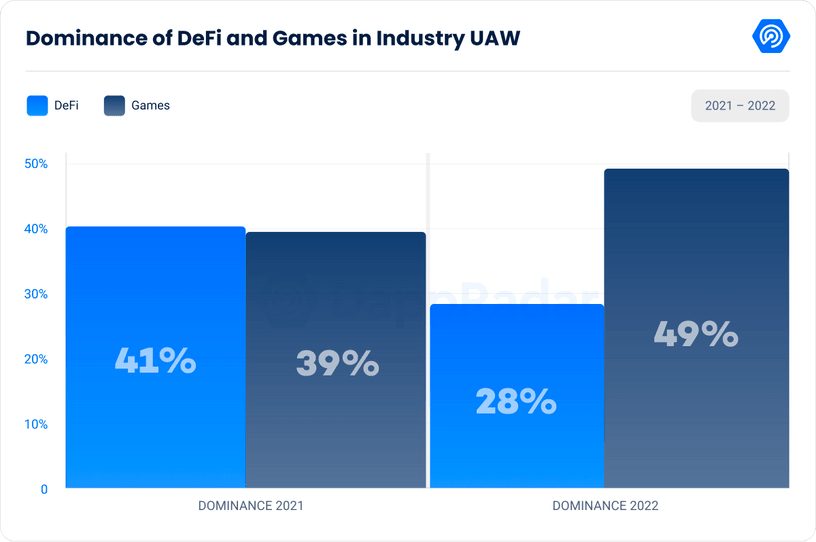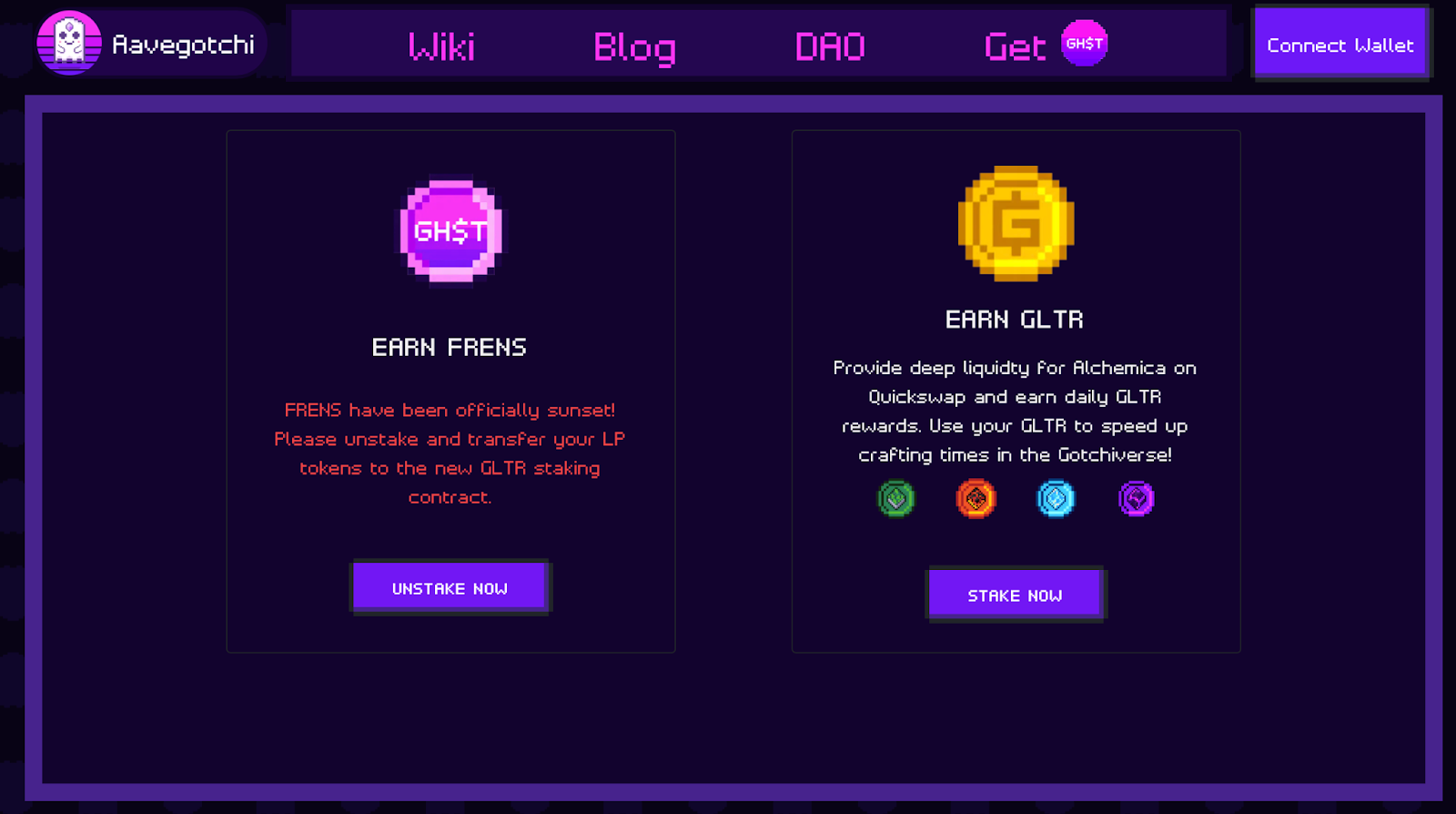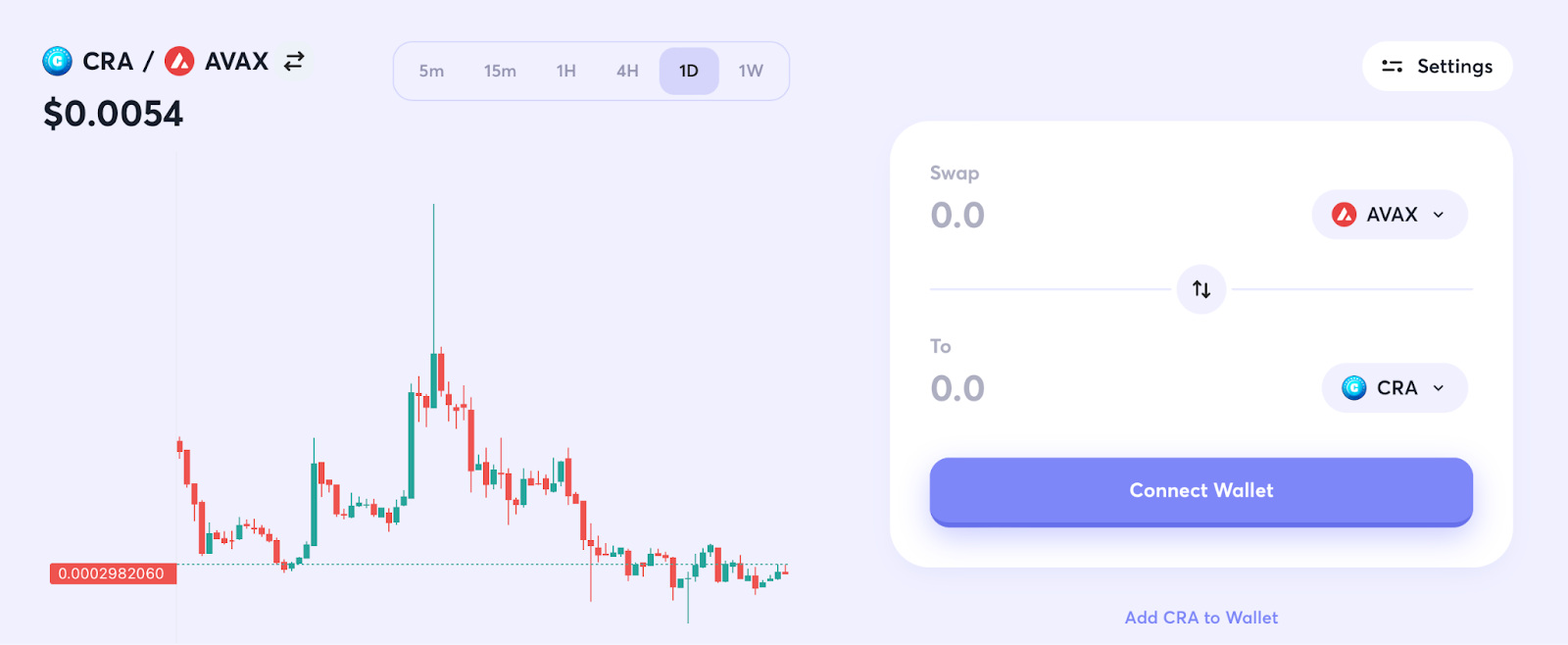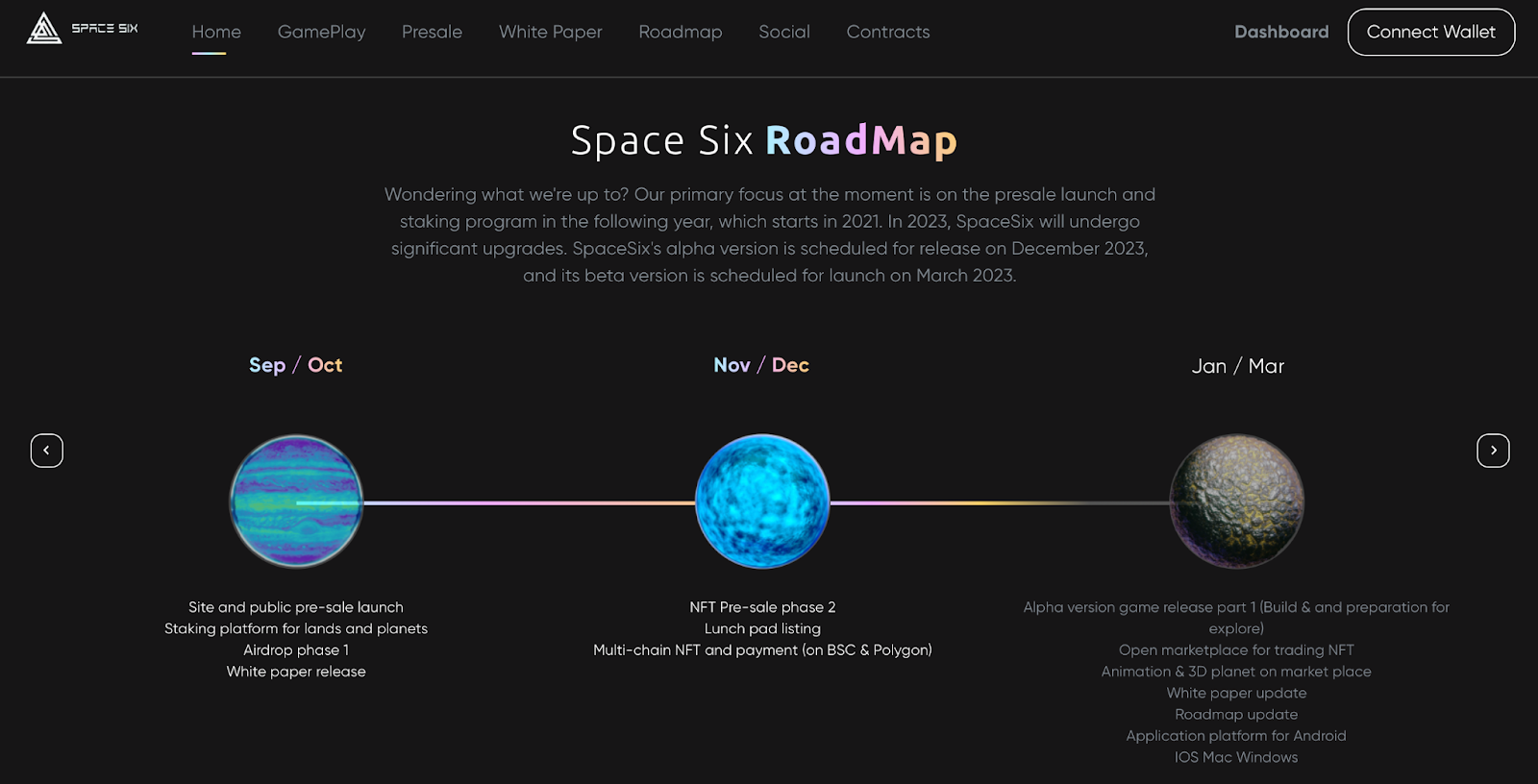
What are decentralized finance (DeFi) games?
Written by Sankrit K
DeFi games offer a new and exciting way for gamers to interact with the world of decentralized finance, earning money as they play.
Unlike with traditional games, players can now earn real-world value by participating in blockchain-based games and leveraging DeFi features, such as in-game assets that can be bought, sold, and traded like real-world assets.
According to DappRadar, DeFi gaming accounts for almost half of all on-chain activity!

As the popularity of DeFi games continues to grow, it’s clear that they are poised to become a major force in the gaming world, shaking up traditional models and paving the way for new and innovative approaches to gaming where gamers earn money while gaming.
In this article, we provide a complete overview of DeFi gaming, covering its benefits, limitations, how it works, and how players can make money with it.
What are DeFi games?
DeFi games are online games that use blockchain technology and DeFi protocols to enable users to gain real-world value from their in-game activity.
Players can earn rewards by playing games, staking tokens, or providing liquidity to decentralized exchanges (DEXs). These rewards can come in the form of in-game tokens, tradable assets, cryptocurrency, or even real-world goods and services.
Unlike traditional games, where the value of in-game assets is limited to the in-game ecosystem, DeFi games allow players to own and trade their digital in-game assets on open markets, creating real-world value.
What is the difference between DeFi games and NFT games?
The main difference between DeFi games and NFT games are that DeFi games primarily focus on using DeFi principles within the game's ecosystem, while NFT games focus on using NFTs to represent in-game assets that can have real-world value.
In DeFi games, players can earn cryptocurrencies by participating in decentralized finance services such as lending, borrowing, and trading within the game's ecosystem. While in NFT games, players can own and trade their in-game assets as NFTs, which can have real-world value.
There is some overlap between these two types of web3 games.
It’s not unusual to find games that incorporate both DeFi and NFT elements into their gameplay. Ultimately, both DeFi games and NFT games represent exciting opportunities for gamers and investors alike, and are helping to drive innovation in the blockchain gaming space.
How do DeFi games work?
DeFi games are blockchain-based games that strive to create a new kind of gaming economy based on decentralized finance principles. They allow players to earn cryptocurrency by playing the game and engaging in various financial activities such as staking, lending, borrowing, and trading.
The technical infrastructure of DeFi games is built on blockchain, which provides a secure and transparent way to store and transfer value. The most common blockchain platforms used for DeFi games are Ethereum and BNB Chain.
DeFi games often have their own native tokens that are used for gameplay and financial activities.
These DeFi tokens are typically issued on the blockchain platform used by the game and can be traded on DEXs. Players can earn these tokens by participating in the game and performing various activities such as completing quests, defeating enemies, or staking tokens.
1. Smart Contracts
Smart contracts are used in DeFi games to manage game logic, token economics, and financial transactions.
For example, a smart contract can be created to manage the staking of tokens in a game. When a player stakes their tokens, the smart contract automatically locks them up and issues a new token representing the stake. When the staking period ends, the smart contract releases the original tokens and distributes rewards to the player.
2. Use DEXs
DeFi games also use decentralized exchanges (DEXs) to enable the trading of game tokens. DEXs are platforms that allow users to trade cryptocurrencies without needing a centralized intermediary.
3. Lending and Borrowing
In addition to staking and trading, DeFi games also incorporate lending and borrowing. Players can lend their tokens to earn interest or borrow tokens to use in the game. Lending and borrowing are facilitated by smart contracts that automatically manage the borrowing and repayment process.
How do people make money playing DeFi games?
Most DeFi games follow the Play-to-Earn (P2E) model. Naturally, game developers design multiple ways for players to make money while gaming such as trading collectibles, providing gaming rewards, offering staking and yield farming rewards, and hosting competitions.
1. Collectibles Trading
Many DeFi games offer in-game collectibles that can be bought, sold, and traded on blockchain-based marketplaces. These collectibles are often unique and limited in number, making them valuable to collectors.
2. Gaming Rewards
Some DeFi games offer rewards to players for participating in the game. These rewards can be in the form of in-game currency (cryptocurrencies) that can be exchanged for real-world money.
For example, in the popular game Axie Infinity, players can earn the game's in-game currency, $SLP, by completing battles and quests. The $SLP token can then be exchanged for cryptocurrencies on crypto exchanges.
3. Staking and Yield Farming
DeFi games often incentivize players to lock up their tokens in order to earn rewards or participate in governance. This process is known as staking or yield farming.
Staking involves holding a certain amount of cryptocurrency in a wallet to receive emission-based rewards. For example, in the game Aavegotchi, players can stake their $GHST tokens to earn rewards in the form of more $GHST tokens.
4. Competitions and Tournaments
Many DeFi games offer competitions and tournaments with prizes in cryptocurrencies. These competitions can provide gamers with significant amounts of money paid out in cryptocurrencies.
For example, in the NFT card game Gods Unchained, players can compete in tournaments for prize pools as high as $70,000 in cryptocurrencies.
DeFi Games Examples
Aavegotchi, Crabada, and Space Six are three DeFi games. This section will explain their gameplay and tokenomics so you can understand how they work.
1. Aavegotchi
Aavegotchi is an Ethereum-based game that was created by Pixelcraft Studios and designed to be a fun and interactive way for players to earn rewards while participating in DeFi activities.

Gameplay
In Aavegotchi, players can collect and trade NFTs called Aavegotchis, which are ghost-like creatures that live in the game's virtual world.
Players can earn rewards by staking Aave tokens to generate yield, which can then be used to purchase and upgrade their Aavegotchis.
Players can also participate in mini-games, quests, and challenges to earn additional rewards.
Tokenomics
Aavegotchi has its own native token, called $GHST, which is used as a medium of exchange within the game. Players can use $GHST to buy and sell Aavegotchis on the game's marketplace, as well as to purchase in-game items and services.
The $GHST token can also be staked to earn rewards, which are distributed to players based on their contributions to the game's ecosystem. The more $GHST a player holds and stakes, the more rewards they can earn.
2. Crabada
Crabada is a web3 game on the Avalanche blockchain featuring NFTs of fierce fighting hermit crabs. Players rise to the challenge by taking down powerful foes and investing by buying more NFTs to turn greater profits.

Gameplay
In Crabada, players collect and train NFT hermit crabs to fight in battles against other players or AI opponents. The crabs have unique stats and abilities that can be improved through training, and players can earn rewards for winning battles.
Additionally, the game features idle mechanics, allowing players to continue earning rewards even when they are not actively playing.
Tokenomics
Crabada's tokenomics are designed to create demand for the game's NFTs. Players can earn the game's native token, $CRAB, by participating in battles and other in-game activities. The token can then be used to purchase new hermit crab NFTs or to upgrade existing ones.
The game also includes a staking system, where players can earn additional $CRAB by staking their NFTs.
3. Space Six
Space Six is a Play-to-Earn (P2E) game developed on the BNB Chain. It is designed to maximize potential earnings for players. It is one of the many NFT games available on the BSC ecosystem. With its Explore-to-Earn feature, players can earn rewards by exploring the game's virtual world and discovering hidden treasures.

Gameplay
In Space Six, players can purchase NFTs and use them to explore the game's virtual world, where they can collect resources, craft items, and battle against other players.
The game also features an augmented reality (AR) upgrade, allowing players to check their NFTs using their phone's camera and show them to others in real time.
Tokenomics
Space Six uses the BEP-20 token standard on the BNB Chain. The game's native token, $SIX, is used for in-game transactions, such as buying and selling NFTs, crafting items, and participating in battles. Players can earn $SIX tokens by participating in the game's Explore-to-Earn feature or by staking their NFTs in the game's staking pool.
Start Playing DeFi Games
DeFi games are an exciting new development in gaming, offering gamers a unique and immersive experience that combines the innovation of decentralized finance with the fun and engagement of online gaming.
While DeFi gaming is still in its early stages, it has already shown significant promise in terms of providing players with new ways to earn and engage with games.
As the technology continues to advance and more game devs and players enter the space, expect to see more innovative and exciting DeFi gaming experiences.

Related overviews
Learn how Japan's government is accelerating innovation and how companies are using blockchain technology.
Japan Airlines and Calbee, a Japanese Snack Food company, are using NFTs to promote tourism and brand loyalty.
WaveHack is the biggest web3 hackathon in Japan, and is being held from mid-April to the end of August 2024.

Build blockchain magic
Alchemy combines the most powerful web3 developer products and tools with resources, community and legendary support.